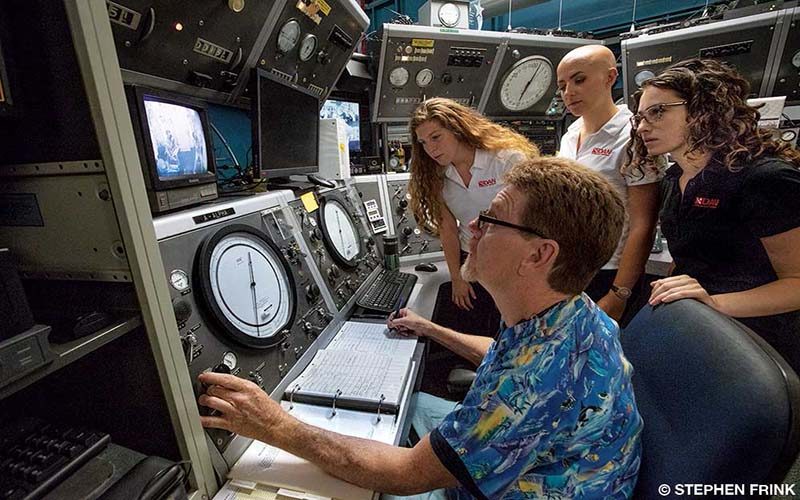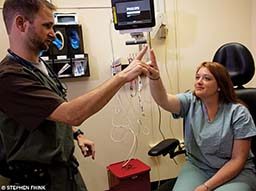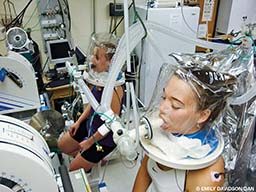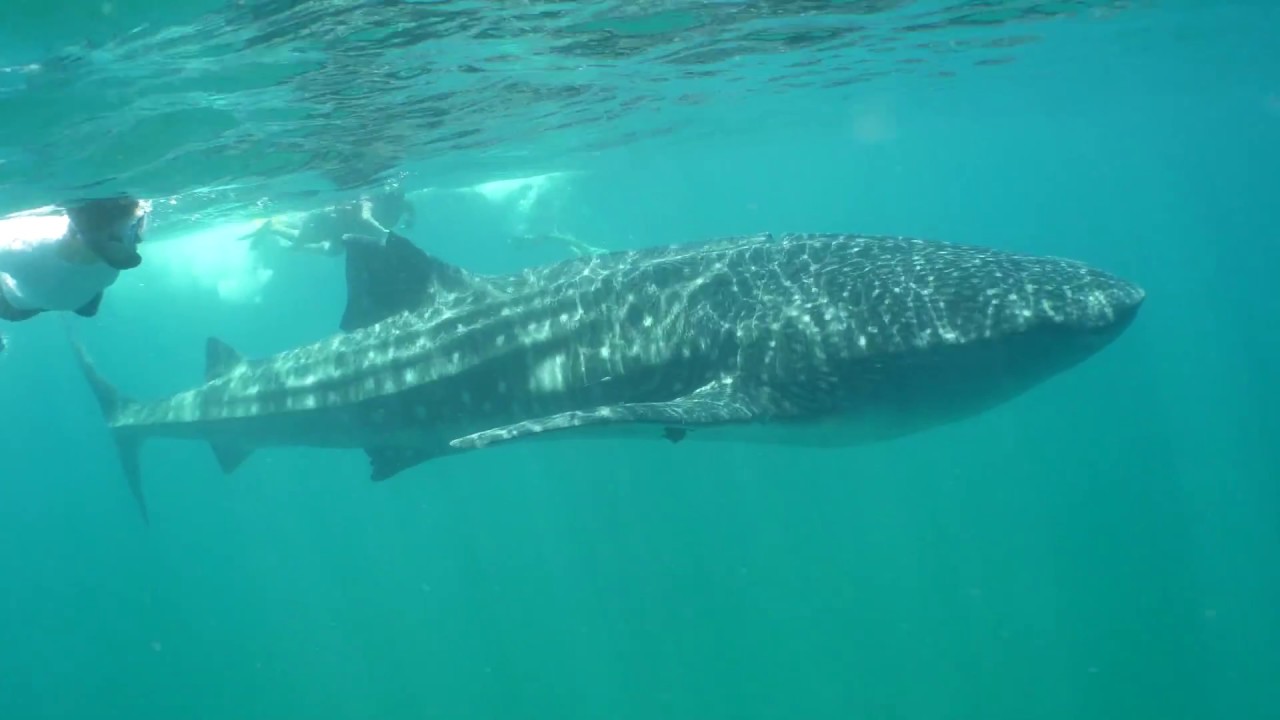Supporting the next generation of dive researchers, scientists and educators through annual internship programs, fellowships and grants, Divers Alert Network® (DAN®) provides these future dive leaders with funding, mentors and the opportunity to participate in scientific research projects.
Through the experience and professional connections made during their internships, numerous students have moved on to successful careers in dive medicine and research. Their innovations and discoveries benefit divers around the world, and DAN is proud to have played a role in their professional development.
Internships
DAN’s internship program began in 1999 as part of Project Dive Exploration (PDE). Today, DAN interns participate in a range of research activities including field work, lab studies and other projects that contribute to dive safety.
In addition to supporting the careers of young scientists, the internship program enables DAN to make greater strides in dive research. For example, an intern may assist with data collection and then work alongside a DAN researcher to analyze the data and draw conclusions. This collaboration enhances the dive industry’s workforce and helps further DAN’s mission to make every dive safer.

At DAN, interns are more than just an extra set of hands; they are partners in research. Students work closely with seasoned professionals to gain valuable insights about a future career in dive medicine, hyperbaric research or dive safety. The internship provides students with hands-on experience to help them decide which field of study is the best choice for their interests and skill sets.
Each internship lasts approximately three months, typically from late May through August. DAN provides each intern with room, board and a stipend for living expenses. As of 2018, DAN has invested more than $1 million in its internship program and recently welcomed its 100th intern to DAN Headquarters in Durham, North Carolina.
After the internship, DAN staff may connect the student with a permanent position or act as a job reference. The following are updates from a few interns who went on to successful careers in the dive industry.
John Littlefield (2009)
John Littlefield, M.A., R.P.A., came to DAN as a nautical archeology graduate student from Texas A&M University. As part of his summer internship, Littlefield worked with the Institute of Nautical Archaeology (INA) collecting and collating dive profile data from divers excavating a first-century shipwreck off the coast of Turkey.
“Our data was somewhat unique compared to the data collected by interns working at recreational dive sites,” Littlefield explained. “We had very little variation in the dive profiles. The divers would drop to the seafloor, work for 20 minutes and then ascend to decompress. Also, our site was deep, 98 to 147 feet (30 to 45 meters), so we used special dive tables utilizing in-water oxygen decompression developed by Richard Vann of DAN for INA.”
Littlefield’s internship at DAN piqued his interest in dive safety and eventually led to work as a dive safety officer (DSO). “The DAN internship opened doors for me to serve as a DSO on archaeological projects in the U.S., Turkey and Italy. I also had the privilege of diving with nautical archaeology pioneer and legend George Bass on his last career dives.”
In 2017 Littlefield became a scuba instructor and the DSO for INA. His work as a DSO includes evaluating dive safety plans and ensuring every project team member has training in first aid, CPR and oxygen administration.
“Besides being deeply entrenched in dive safety, I continue to work in the nautical archeology field,” Littlefield said. “This summer I get to participate in a coastal survey of Albania, a true perk of the job!”
Littlefield’s scuba career recently came full circle when his alma mater asked him to serve on their dive control board. “Because of my work with INA and our long history of dive safety,” he said, “I was recently approached by Texas A&M University to help develop a new dive safety program for the main campus.”
Leah Potts (2015)
Discovering a career passion is a common theme among former DAN interns. But for Leah Potts, DAN was a springboard to a variety of diving-related projects and learning opportunities.
During her internship, Potts worked with Peter Buzzacott to analyze 30 years of cave diving fatalities. “Trying to decipher what had happened in each incident was difficult,” Potts said, “but this was important work to improve cave diving safety guidelines.”
Potts’ mentors at DAN encouraged her to apply for the elite Our World-Underwater Scholarship Society’s Rolex Scholarship, which she won in 2017. As part of her year of study, Potts learned underwater photogrammetry (the process of obtaining information about objects, such as measurements, using photographs and 3-D modeling) and lent her skills to the Wisconsin Historical Society.
“I traveled to Madison, Wisconsin, for a 10-day topside and underwater survey of the Captain Roberts Mine,” Potts said. “I made 3-D models of the underwater artifacts such as drills and carts. After days of data processing, we put together an application and received approval to assemble a National Register of Historic Places nomination of the above and below water portions of the site.”
In October 2017, thanks to connections made at DAN, Potts traveled to Shanghai, China, to learn from Lu Shi, associate professor at the Chinese Underwater Technology Institute. Over the next few weeks, Potts observed and participated in diver physiology research, specifically on commercial divers working at altitude and divers who use manned submarines.
Stefanie Martina (2011)
After her internship at DAN, Stefanie Martina worked as a research assistant at the Duke Center for Hyperbaric Medicine and Environmental Physiology. She later returned to DAN as a research associate and participated in dive safety research on narcosis, immersion pulmonary edema and flying after diving.
“My DAN internship experience helped kindle my passion for scuba diving safety research and prepare me for a career in academia,” Martina said. “It also helped me foster relationships with professionals in my field, which led to employment and educational opportunities.”
Martina is currently working on a master’s thesis with Heather Carnahan at the Ocean Safety Research Lab at the Memorial University of Newfoundland Marine Institute’s Offshore Safety and Survival Centre. Her research examines the effectiveness of in-water helicopter escape training during daylight conditions compared to darkness.
“Within the past year, the offshore industry added scuba tanks to their underwater escape training,” Martina said. “The training is often conducted in the light due to logistics and increased risk and anxiety associated with darkness, but learning these skills in the dark is more realistic for a helicopter escape. The evidence suggests there is an optimal anxiety level during learning — too much is detrimental, and too little isn’t stimulating enough to support learning. This research is applicable to any skill that may be done in dark, anxiety-inducing conditions such as cave and night diving.”
Martina received both the 2017 Women Divers Hall of Fame Advanced Dive Training Grant and the Academy of Underwater Arts and Sciences Zale Parry Scholarship. She is currently pursuing a master’s degree in kinesiology with a focus on human factors in extreme environments.
Additional Highlights

A 2018 intern with a background in data science used his skills to process more than 140 million hospital records. Other recent intern projects include collecting data for a patent foramen ovale (PFO) study, gathering buoyancy measurements in a lake, learning about research ethics and assisting with the research, writing and review of medical journal articles.
DAN interns are generally undergraduates and first-year master’s degree students. Nonstudent candidates with a scientific background and interest in diving are also eligible to apply. Divers who are interested in becoming a DAN intern can learn more by visiting DAN.org/research/intern. Applications for the 2019 program are due Jan. 31, 2019.
Top candidates must possess excellent communication and organizational skills, a demonstrated commitment to diving and a career path that would be enhanced through participation in the program. Though diving activities are not necessarily part of the internship, candidates should be certified scuba divers with sufficient diving experience.
Our World-Underwater Scholarship Society Internship
DAN, in partnership with the Our World-Underwater Scholarship Society (OWUSS), offers an annual Diver’s Safety Educational Internship. The OWUSS intern spends 8-12 weeks at DAN headquarters in Durham, North Carolina, participating in activities related to their interests and personal goals. Former OWUSS interns have helped develop dive safety guidelines, participated in various studies on decompression sickness (DCS) and collected diver data for PDE.
The OWUSS internship includes housing, food and a stipend to cover related expenses, including travel to and from internship sites. Candidates must have high academic standing and be certified as a Rescue Diver or equivalent with a minimum of 25 dives logged within the past two years. More information is available at owuscholarship.org/internships.
Hyperbaric Fellows

Hyperbaric fellows are licensed physicians who spend one year receiving education and training in the theory and practical application of hyperbaric medicine. Once their training is complete, successful candidates may pursue a career in hyperbaric research or supervise a hyperbaric chamber.
Fellows from partner universities spend one week immersed in medical- and research-related activities at DAN. The fellow spends time observing and participating in the daily operations of DAN Medical Services, discussing current projects with DAN Research personnel and learning about the clinical application of diving physics.
DAN’s official university affiliates are the University of California, San Diego, and the University of Pennsylvania. DAN, however, has welcomed fellows from State University of New York Upstate Medical University, Duke University Medical Center, the Wound Recovery and Hyperbaric Medicine Center at Kent Hospital in Warwick, Rhode Island, and the Wilderness Medicine Fellowship at Massachusetts General Hospital in Boston, Massachusetts.
Hamilton Memorial Dive Medicine Research Grant
Bill Hamilton, Ph.D., spent more than 40 years researching diving physiology and the treatment of injured divers. In 2015 DAN created the R.W. “Bill” Hamilton Memorial Dive Medicine Research Grant to support future advancements in dive research. Each year DAN awards $10,000 to a deserving scientist with a new or ongoing research project closely related to Hamilton’s work.
Areas of focus may include the physiology of decompression stress; development of decompression procedure techniques for commercial, military, technical and/or recreational divers; comparative dive computer effectiveness studies; or treatment of incomplete decompression and resulting incidents. The inaugural recipient, Ingrid Eftedal, Ph.D., used the funding to study the immune systems of offshore saturation divers in Norway.
The annual grant is offered in conjunction with the Women Divers Hall of Fame and scheduled to continue through 2020.
Investing in the Future of Dive Safety
DAN is proud to give back to the dive community through its scholarship programs. These future dive leaders are an essential part of DAN’s ongoing mission to promote dive safety through research and education.
The programs and initiatives developed by DAN interns, grant recipients and fellows help make every dive safer and would not be possible without DAN membership dues and donations. People who wish to donate directly to the internship program may do so at DAN.org/donate. A donation in any amount is welcome, but for reference the cost for each intern’s room, board and research-related expenses is approximately $100 per day.
Explore More
| © Alert Diver — Q3 2018 |

